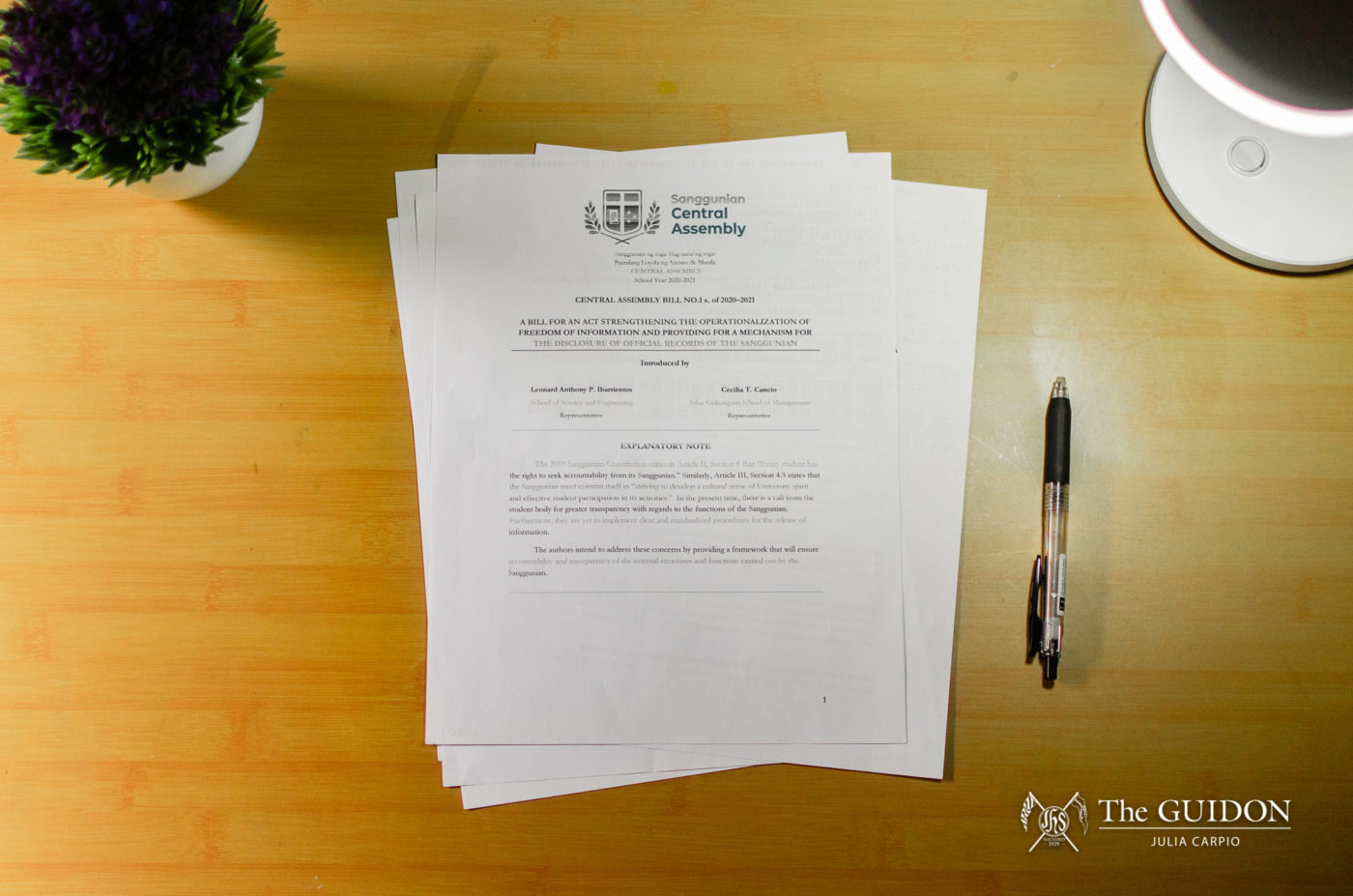IN A bid to enhance transparency efforts, the Sanggunian Central Assembly (CA) seeks to pass the Freedom of Information Act of 2020, which will open official Sanggunian records and documents to the student body.
Authored by former School of Science and Engineering Representative LA Ibarrientos and Interim John Gokongwei School of Management (JGSOM) Representative Cecilia Cancio, the Act will allow students to view and question any decision and resolution of the Sanggunian.
Although memoranda, minutes of Cabinet meetings, and official statements are regularly uploaded to the Sanggunian Gazette Website, Cancio said that the approval of the Act will grant students access to department records and expenditures.
Process of transparency
According to Ibarrientos, the Act was created to institutionalize a formal process of requesting information from the Sanggunian as well as penalize Sanggunian officers for non-compliance to its provisions.
“As much as we try to announce many things [to the student body], […] there’s no formal process of requesting for any kind of transparency from Sanggu, and that’s what we’re trying to address,” he explained.
Cancio shared that the Act also aims to disclose the Sanggunian’s budget and usage of funds—a portion of which is taken from the students’ tuition fees.
“The thing is, [financial information is] not disseminated properly. How exactly do we use those funds? That’s actually one of the reasons as to why we pushed for [this Act], so that the students can know where their money is going,” she said.
In handling requests for official records, Cancio added that the process involves the liaison information officer and the transparency information Officer. The chiefs-of-staff of each School Sanggunian are automatically appointed as liaison information officers, while the latter is appointed by the vice president among members of the Office of the Vice President (OVP) Internals Division. All requests will be processed by the officers through the Sanggunian Gazette Website or the Sanggunian email, should the former be inaccessible.
“At the end of each process, even if it’s a request for a digital or hard copy, it will be recorded in the document request log to keep track of all requests of information. […] That’s when the requestor receives the document,” Cancio said.
Ibarrientos said that general requests are processed within 14 days, while urgent requests such as those from the media will be processed within seven days. However, he emphasized that confidential records will not be released to the public.
“There are processes that are ongoing so hindi pa puwede ilabas ang records (records cannot be disclosed). For example, […] security and emergency plans. I think it’s imperative to keep it confidential especially since it concerns the safety of members,” he said.
Decision and implications
Interim Sanggunian President Jb Bejarin shared that the OVP first drafted the bill in December 2019. However, Ibarrientos and former JGSOM Representative Mica Torres took custody of the bill a month later, after expressing interest.
Due to the Sanggunian’s changes to the Code of Legislative Procedures and Torres’ resignation on June 11 and August 9, respectively, the CA reviewed the draft again from the First Reading.
The CA passed the Act after its first and second readings in early September, but Bejarin partially vetoed it due to Section 13, which detailed the penalties incurred for violations committed by a Sanggunian officer.
Citing the 2019 Constitution of the Undergraduate Students, he deemed this as unconstitutional. “[What’s wrong] is the power we give to the [OVP] to remove and suspend members, when the Constitution says that there’s another body in charge of that, which is the Student Judicial Court (SJC). It’s that branch of Sanggu that students should avail accountability from,” he said.
Following this, Cancio said that she revised the provision to clarify the SJC’s jurisdiction in imposing penalties for Sanggunian officers and the OVP’s role in reporting cases to the SJC.
Bejarin said that through the Act, students can demand transparency from the Sanggunian and hold its officers accountable with the information they request. “Point it out, get it investigated, [and] SJC will do the impeachment procedures,” he said.
Transparency efforts
Bejarin revealed plans to form a Technical Working Group to create the Code of Communications Procedures, which will improve their communication strategy across all departments. This aims to refine the existing structure of the Sanggunian in order to “reach [their] audience more effectively and more naturally” and clarify which commission or department disseminates certain information.
He also mentioned the goal to involve the student body more closely along with strengthened transparency so that students can actively participate in the Sanggunian’s decision-making process. Emphasizing the release of files as basic transparency, Bejarin added that there is a need for a strategy behind these efforts.
“At the end of the day, it doesn’t only benefit you, me, or any single student. It benefits the community. […] Transparency, at the end of the day, needs empowerment,” Bejarin said.







